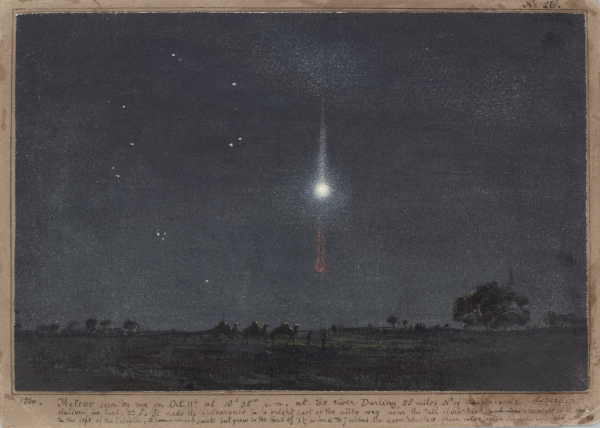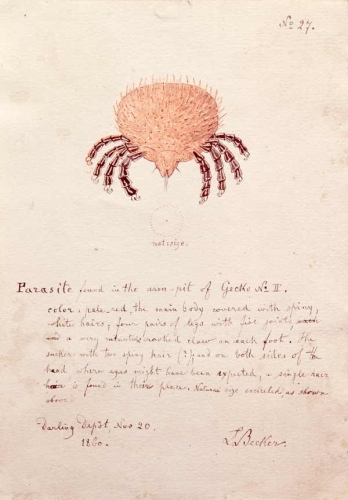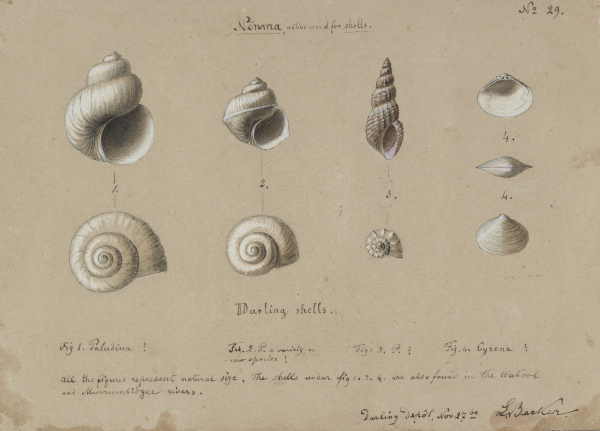|
Monday, 24 September 1860.
Marched at 7¾ a.m. in a N.W. by N. direction. A young native, acting as a guide, sat on one of the waggons, while his uncle Whitepeeper or the 'old man' as he was called by all the natives of the district, walked in front of us with a fire-stick in one hand and a yam-stick in the other, as I have shown in Sketch No 9. This 'old man' appeared to be of the age of 70; his hair is not white but has a peculiar pale greenish-yellow tint, and is beautifully curled by the hand of nature. I made a profile-drawing of the head of this man who seemed to me to be a fair specimen of an old but still hardy aboriginal of this district. Our way led through Mallee-scrub and over some plains; the ground being again so heavy our poor horses could not do more then pull the waggons through the sand at the rate of one mile and a half per hour. The country is an undulated one; the tops of the low hills generally covered with sand and full of Wallaby holes." We arrived at sunset at a spot about 10 or 11 miles from our last camp at an open ground, in the midst of the bush, where we camped for the night. We did not meet with a drop of water during the journey, but a meadow with fine grass and myriads of mosquitoes hovering over it told us that the ground was still moist from the late heavy falls of rain. I believe in case of necessity we should have found water there after digging only a few feet into the ground.
Tuesday, 25 September 1860.
At 8 a.m. I rode on in advance to look for water and to report it when found. Following the faint track of Professor Neumayers vehicle I found, after two hours ride and about seven miles distance from where I started this morning, an indention of the ground with a gallon and a half of green fluid in it, which even my poor horse refused to swallow. Here also saw the 'water-indicator', the red and yellow-crested cockatoo, but this time flying only over a stagnant puddle. From that place I rode in a more northerly direction towards Scott's station where, as our black guide has told us, we would meet with a good supply of water. I found it at noon, and rode two miles further on to the overseers but for the purpose of obtaining a fresh horse to enable me to bring words to my companions in the rear; I was told the horses were not at home but every moment expected. After vainly waiting for one hour I was obliged to mount once more my tired beast and go back on my track. When scarcely a mile away I was overtaken by a tremendous thunderstorm. Hail and rain were blown by the gale in nearly a horizontal direction over the plain and so dense was the shower that no object further than a few yards was visible. The horse at once refused to go on, it turned round and. with the head leawards licking the small pools of fresh water just forming under his eyes. After some time, the rain abated, I rode on and, as I thought, in the right direction but soon found out that I have lost my way. This was the first time in my life I met with such an accident, and when I discovered the fact a very strange but most disagreeable sensation overcame me. It was now raining and neither sun nor horizon visible; sunset, still, I composed my mind and moved on systematically; this brought me after some time to the right track which led me on the top of a small rise from where I espied in the distance two white spots, which turned out to be two of our waggons just arrived at the water-hole. I learned that Mr Burke has send a black-fellow with a message to Dr Beckler, and the Native advised him to take another, a shorter, trip through the bush, the road I have taken being a longer one. Having lost my way in the open plain I was by this saved from being bushed for the night, as I never could have met in time my fellow travelers. Dr Beckler told me that the drivers had been obliged to leave behind five waggons but intend to fetch them over, one by one, the next day. -For the night the Doctor and myself sought shelter under a tent rather too temporally pitched over a soaked ground; the other men went in and underneath the two waggons wrapping themselves in every kind of rags and rugs, all our comforts having been left behind with the other waggons, however, we considered ourselves comfortable enough and fell soon asleep not dreaming of the scene which the atmosphere had in store for us.
Wednesday, 26 September 1860.
The wind all day yesterday came from the north but shifted soon after midnight to the S.W. and from this morning it blew a Hurricane. The first gust carried our tent into the air, together with the two saplings we had used as supporters -it came down again and fell right over me; my head had a narrow escape from being crushed as on of the poles fell alongside of it. The Doctor found himself in the open air and I was nearly suffocated under the pressure of canvass before I could extricate myself The scene was one of great confusion, at the same time to me so ludicrous that I could not help laughing, while the Doctor held a different opinion. After saving my watch and protecting some other valuables against the flood of water which rushed over the ground, we crept under the waggons and I had ample time there for meteorological observations. About 5 o Clock a.m. the hurricane was over, but for several hours the rain continued to fall in torrents. At 8 a.m. the men returned to the bush to fetch the waggons and they all arrived soon after sunset; no damage was done to the vehicles nor their contents injured. I heard later, at Menindie, which is about 100 miles N.E. from Orompo, the place where the hurricane visited us that at the same day a great thunderstorm had swept over that country sending down hall stones of irregular shape and more than one inch in diameter. |
|






